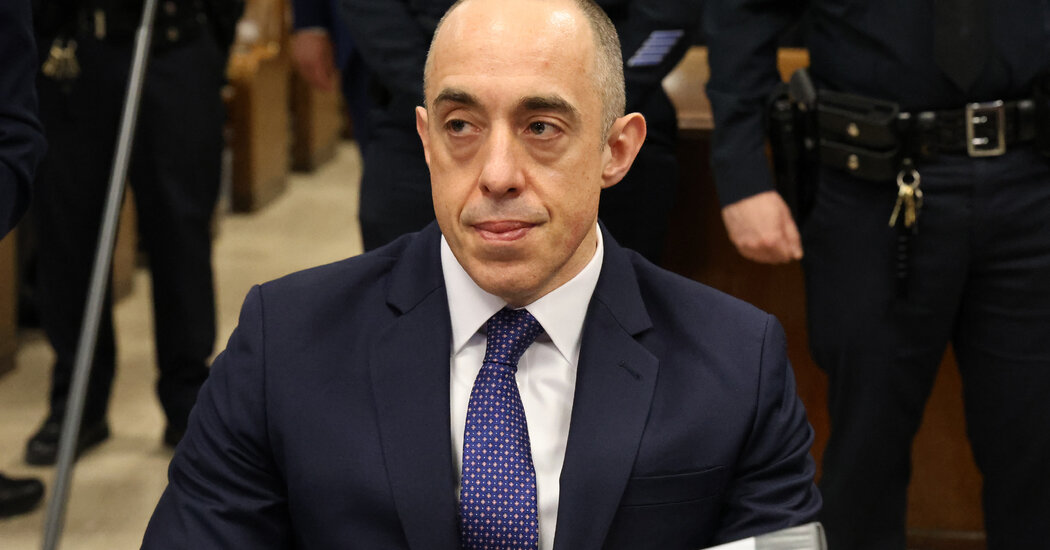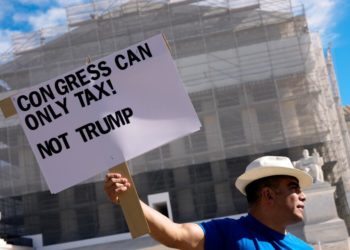A senior Justice Department official, Emil Bove III, told subordinates he was willing to ignore court orders in order to fulfill the president’s aggressive deportation campaign, according to a whistle-blower complaint by a department lawyer who has since been fired.
The account by the dismissed lawyer, Erez Reuveni, paints a disturbing portrait of his final three weeks on the front lines of the Trump administration’s legal efforts to ship immigrants overseas, often with little notice or recourse. In Mr. Reuveni’s telling, Mr. Bove used an expletive as he discussed disregarding court orders, and other top law enforcement officials showed themselves ready to stonewall judges or lie to them to get their way.
Mr. Reuveni’s account, which was reviewed by The New York Times, was filed to lawmakers and the Justice Department inspector general on Tuesday, just one day before Mr. Bove is scheduled to testify before the Senate Judiciary Committee for a nomination to a federal appeals court. Mr. Reuveni was a career lawyer at the Justice Department for nearly 15 years until April, when he appeared in a federal court in Maryland and expressed concern that the administration had mistakenly deported a migrant to a megaprison in El Salvador. Mr. Reuveni was put on administrative leave a day later and ultimately fired.
President Trump and his aides have labeled Mr. Reuveni a disgruntled and disobedient former employee, and are likely to amplify those criticisms in response to his decision to become a whistle-blower. The filing, however, suggests a copious trail of emails, texts and phone records would support his version of events, and notes that he had diligently defended controversial policies of the first Trump administration.
Until now, Mr. Reuveni had stayed silent about the circumstances of his departure. A 27-page account, filed by his lawyers at the Government Accountability Project, Dana L. Gold and Andrea Meza, offers a host of new details and allegations about the inner workings of the Justice Department under Mr. Trump.
It adds that Mr. Reuveni “will continue to tell the truth in defense of the rule of law.”
In March and early April, the filing states, Mr. Reuveni “became aware of the plans of D.O.J. leadership to resist court orders that would impede potentially illegal efforts to deport noncitizens, and further became aware of the details to execute those plans.”
Top officials at the Justice Department and the White House sought to defy federal court orders “through lack of candor, deliberate delay and disinformation,” his account states.
“Discouraging clients from engaging in illegal conduct is an important part of the role of a lawyer,” the account says. “Mr. Reuveni tried to do so and was thwarted, threatened, fired and publicly disparaged for both doing his job and telling the truth to the court.”
A pivotal meeting occurred on March 14, when Mr. Bove, a senior official in the deputy attorney general’s office, spoke bluntly about the administration’s plans. He informed his subordinates that Mr. Trump would soon invoke the Alien Enemies Act in order to rapidly fly a group of immigrants out of the country that weekend. Two other officials in that office, James McHenry and Paul Perkins, were in attendance, as well as Mr. Reuveni’s supervisors, Drew Ensign and August Flentje, according to the whistle-blower document.
Mr. Bove “stressed to all in attendance that the planes needed to take off no matter what,” according to Mr. Reuveni’s account. Mr. Bove then broached “the possibility that a court order would enjoin those removals before they could be effectuated.”
“Bove stated that D.O.J. would need to consider telling the courts ‘fuck you’ and ignore any such order,” according to the account. “Mr. Reuveni perceived that others in the room looked stunned, and he observed awkward, nervous glances among people in the room. Silence overtook the room.”
Mr. Reuveni and others were “quickly ushered out of the room,” the account says. It continues: “Notwithstanding Bove’s directive, Mr. Reuveni left the meeting understanding that D.O.J. would tell D.H.S. to follow all court orders.”
As far as Mr. Reuveni knew, “no one in D.O.J. leadership — in any administration — had ever suggested the Department of Justice could blatantly ignore court orders, especially with” an expletive, his account states. “Mr. Reuveni was in disbelief.”
Mr. Reuveni’s account highlights the tensions that have been roiling the Justice Department for months, where many current and former career lawyers have come to fear that the department’s political leadership, chosen by Mr. Trump, is engaged in a systematic effort to undermine the rule of law.
A Justice Department spokesman did not immediately comment on Mr. Reuveni’s whistle-blower filing.
Those appointees, including Mr. Bove, maintain that their goal is to end “weaponization” of the Justice Department, citing as examples of prior prosecutorial wrongdoing the criminal cases filed against Mr. Trump, Jan. 6 rioters and other conservatives who claim to have been unfairly targeted.
To many of the thousands of lawyers who work in the Justice Department, those claims ring as a hollow rationalization for its leadership’s willingness to use the criminal justice system to pursue a vengeful right-wing agenda.
Already, hundreds of department lawyers have quit rather than follow the course being set by the Trump administration. Scores of others have been demoted or fired.
Mr. Reuveni’s experience has elicited major concern within the rank and file of the department, as many current and former department lawyers believe he was placed in an impossible position — ordered to ignore or mislead the courts, which is a potentially career-ending violation of legal ethics.
Mr. Reuveni’s account describes three instances in which senior Justice Department officials engaged in wrongdoing by ignoring court orders, presenting legal arguments with no basis in law, misrepresenting facts to the courts, and directing him in one instance to misstate facts in violation of his “legal and ethical duties as an officer of the court.”
One of those cases involved the administration’s use of the Alien Enemies Act on March 15 to justify flying more than 100 Venezuelans the administration declared were gang members to CECOT, the El Salvador megaprison.
At a hastily convened hearing that day, a federal district judge in Washington, James Boasberg, asked Mr. Ensign if any deportations or removals were imminent “in the next 24 or 48 hours,” prompting Mr. Ensign to respond, “I don’t know the answer to that question.”
That answer, according to Mr. Reuveni’s account, was false. “Ensign had been present in the previous day’s meeting when Emil Bove stated clearly that one or more planes containing individuals subject to the A.E.A. would be taking off over the weekend no matter what,” the account states.
While Mr. Ensign represented the government in court, Mr. Reuveni listened by phone, sending updates to lawyers at the Departments of State and Homeland Security.
At 6:44 p.m., Mr. Reuveni texted his supervisor, Mr. Flentje, referring to Mr. Bove’s disparaging comment toward the judicial system. Mr. Flentje, his account continued, “acknowledged Bove’s comment with a joke referencing the possibility that either he or Mr. Reuveni could be fired, impliedly for reporting up their chain of command concerns that a court order may have been violated.”
About 20 minutes later, Mr. Reuveni emailed D.H.S. and State Department officials that “no one subject to A.E.A. in our custody can be removed.”
The email continued: “And anyone in the air should be returned, unless they have” a different legal authorization for deportation. Lawyers for those two agencies did not respond to his email.
A short time later, he followed up with another email insisting, “we need to address this asap to avoid contempt,” but again, received no response.
Behind the scenes, government lawyers struggled to make sense of how to proceed given their vague instructions. Over the next day, his account states, “it became clear to Mr. Reuveni” that the Departments of State and Homeland Security “were receiving contrary directions from someone else to take actions in violation of court orders.”
According to an email Mr. Reuveni received from Yaakov Roth, the acting assistant attorney general, “Bove had advised D.H.S. that under the court order it was permissible to deplane individuals on the flights that departed U.S. airspace” before Judge Boasberg’s written order appeared on the court docket.
On March 17, Judge Boasberg instructed the government to explain when the planes departed. After that order, Mr. Reuveni was told by his superiors “that leadership at D.O.J. were reporting ‘down the chain’ that the government was not going to answer the court’s questions about anything that happened before 7:26 p.m. on March 15, and so not to provide information about when the flights took off.”
As the administration continued to stonewall the judge, Mr. Reuveni found it increasingly difficult to get any answers from his bosses, or the agencies he was representing in court, according to his account.
Those difficulties only increased after the administration sent 17 immigrants, which it described as violent criminals and gang members, first to a U.S. military facility in Guantánamo Bay, and then El Salvador.
Those detainees were flown there by military planes, which alarmed Mr. Reuveni because court orders seemed to clearly bar such removals. Mr. Reuveni’s account notes that he was given an elevated title and responsibilities in March by his superiors, and received commendations from his supervisors during the first Trump administration.
By April, however, Mr. Reuveni was increasingly at odds with his bosses, and seemingly frozen out of some of the discussions about how to handle the growing legal problem despite his senior role in the department’s Office of Immigration Litigation.
“The evidence demonstrates,” his account summarizes, “that senior D.O.J. leadership withheld information” from its own lawyers, and provided contrary instructions to other agencies, “which resulted in removals in violation of a court order.”
Mr. Reuveni’s account asserts that a third illegal order came in the case of Kilmar Armando Abrego Garcia, the mistakenly deported immigrant in Maryland who was sent to El Salvador on one of the March 15 flights despite a judge’s prior ruling that he should not be sent there.
At a court hearing, Mr. Reuveni made headlines when he agreed with an earlier admission from the administration that Mr. Abrego Garcia’s removal had been a mistake.
In a phone call afterward, Mr. Ensign, stating that his questions “were prompted by the White House,” asked Mr. Reuveni why he had not argued in court that Mr. Abrego Garcia was a terrorist, according to the account.
Mr. Reuveni replied that no evidence had been found to support such a claim, nor did any of the department’s prior court briefs make that assertion. He added that declaring someone a terrorist did not suddenly nullify whether someone was entitled to due process.
The next day, Mr. Reuveni was told he should sign an appeal brief making the terrorism claim against Mr. Abrego Garcia.
Mr. Reuveni’s lawyers say he resisted, arguing that the law does not allow advocates to make new factual claims, which he saw as “contrary to law, frivolous, and untrue.”
That led to a final standoff with his supervisor, Mr. Flentje, who told him “he should sign the brief and that he had signed up for the responsibility to do so,” the account states.
Mr. Reuveni responded, “I didn’t sign up to lie.”
He was placed on administrative leave hours later, and fired the next week.
Devlin Barrett covers the Justice Department and the F.B.I. for The Times.
The post Justice Dept. Leader Suggested Violating Court Orders, Whistle-Blower Says appeared first on New York Times.




